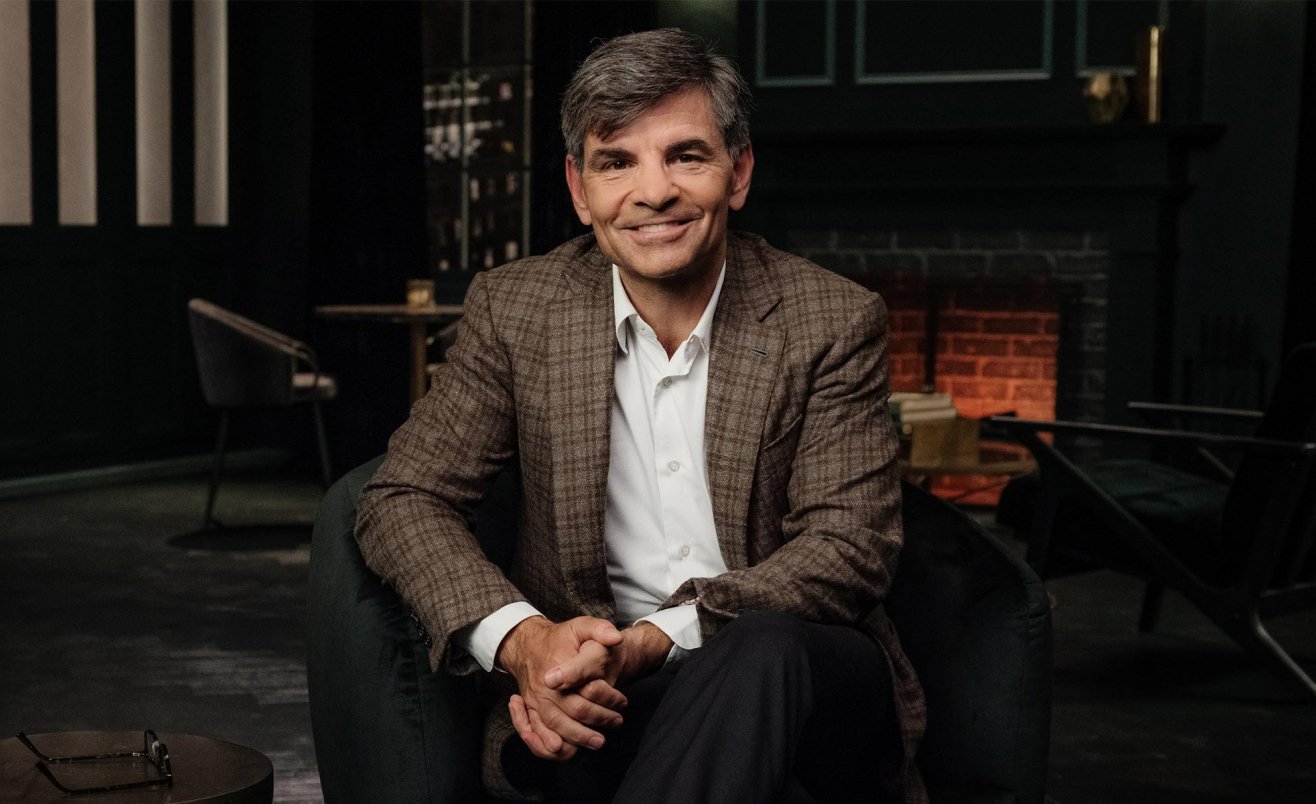Exploring Public Perception: From Clint Eastwood To George Stephanopoulos And Beyond
When we think about prominent figures in the public eye, names like Clint Eastwood and George Stephanopoulos often come to mind, representing different facets of influence, one in cinema and the other in journalism. Yet, the way we perceive individuals, even those sharing a famous name, can be quite varied, and that is that, perceptions are shaped by many things, sometimes even by experiences with entirely different people or characters who happen to bear the same name. It is a very interesting thing to think about, how our feelings shift and change over time, often without us even realizing it, you know?
Our initial impressions of someone, or even a character, might be one thing, but over time, as we gather more information or simply experience more, those feelings can morph. This isn't just about the well-known figures we see on screens; it happens with everyday people too, and it's something that, arguably, influences how we interact with the world around us. So, it's almost like a constant recalibration of our internal compass, wouldn't you say?
This idea of shifting perception is something we see play out in many aspects of life, from how we view software we once used, to the characters in our favorite games, and even how we regard public personalities. It’s a bit like a story unfolding, where each new piece of information, or each new interaction, adds another layer to our understanding, and that, in a way, changes everything, doesn't it?
- Victor Wembanyama Net Worth
- Paul Finebaum Salary
- Bernadette Stanis Net Worth
- Tommy Lee Jones Harvard
- Peter Dinklage Eye Color
Table of Contents
- A Glimpse into the Life of Clint Eastwood
- Clint Eastwood: Personal Details
- The Shifting Sands of Perception: Different "Clints" and Our Views
- From Old Tools to New: A Parallel in Changing Views
- Character Arcs and Public Opinion: The Case of "Clint" in Games
- Trust and Authority: The Herpetologist and the Business Advisor
- Public Life and Managing Expectations: The Streamer's Story
- The Family Spotlight: Curiosity About Celebrity Kin
- Frequently Asked Questions About Public Figures and Perception
A Glimpse into the Life of Clint Eastwood
When we talk about Clint Eastwood, the name itself carries a significant weight, doesn't it? He is, after all, a figure who has made a very lasting mark in the entertainment world. His career, spanning many decades, has seen him move from acting iconic roles to directing and producing films that, in some respects, define genres. It's quite a journey, really, from the early days to becoming a true legend in his field.
People often think of his stoic characters, the ones who perhaps do not say much but convey so much, and that is something that has, arguably, resonated with audiences for a very long time. He has, you know, a particular style, a way of telling stories that feels very distinct. This enduring presence in Hollywood means his name, and his image, are pretty much synonymous with a certain kind of strength and quiet determination.
Thinking about his life, one might wonder about the personal side of such a public figure. There's a natural curiosity about what goes on behind the scenes, and sometimes, the public even speculates about things like family life or personal history. It's just a part of being someone so widely recognized, I suppose, that people want to know more, and that is often why there's interest in things like a reality series about his children, for example, as mentioned, you know, it's a way to peel back the layers.
- Joaquin Phoenix Theo Von
- How Much Is Nba Youngboy Worth
- Tyler The Creator Net Worth 2024
- Denzel Washington Jake Gyllenhaal Movie
- Woody Harrelson Netflix Movie
Clint Eastwood: Personal Details
| Full Name | Clinton Eastwood Jr. |
| Date of Birth | May 31, 1930 |
| Place of Birth | San Francisco, California, USA |
| Occupation | Actor, Film Director, Producer, Composer |
| Active Years | 1955–present |
| Notable Roles | Dirty Harry, The Man with No Name (Dollars Trilogy), Frankie Dunn |
| Key Directorial Works | Unforgiven, Million Dollar Baby, Gran Torino |
The Shifting Sands of Perception: Different "Clints" and Our Views
It's fascinating, really, how our feelings about a "Clint" can change so much, you know? There's a "Clint" from a popular game, for instance, where someone started out feeling a little sorry for him. But then, over time, that feeling, it morphed into frustration, and then, quite eventually, anger. This is a pretty common human experience, isn't it? We might have an initial soft spot for someone, but if their actions or their unchanging ways start to rub us the wrong way, our perspective can really shift. It's almost like a slow burn, where small annoyances build up until they become something much bigger.
And that's not all, because sometimes, people even try to change the "Clint" they perceive, at least in a game setting. There are mods, for example, that rewrite a character like "Clint" to be less focused on one particular person, making his crush more on the down low. This effort to alter how a character behaves, and therefore how they are perceived, tells us a lot about how we wish for things to be different, and that, in a way, is a very human desire. We want to see growth, or at least a different direction, don't we? It's pretty interesting how much effort people put into shaping their experiences, even in virtual worlds, and that is just a part of it.
Then there are the personal stories, like the "Clint" who had two wives before his current one, with one having passed away tragically not long after they married. These personal details, when they become known, can really color our perception of someone. A tragic event like that can evoke sympathy, or perhaps a sense of understanding for a person's journey. It adds layers to their story, making them more complex than just a first impression might suggest. It's a reminder, too, that everyone carries their own history, and that, quite simply, shapes who they are, you know?
From Old Tools to New: A Parallel in Changing Views
Thinking about how our views change, it's a bit like our relationship with technology, isn't it? Take, for example, the experience with torrent clients. Someone might have used uTorrent back in the day, finding it useful, but then, as it started to get filled with ads, it became less appealing. The feeling shifted, and they moved on to something else, like qBittorrent. This change, from satisfaction to annoyance, and then to seeking out a better alternative, is a pretty good parallel for how our feelings about people, or even public figures, can evolve. We might like something at first, but if it starts to show aspects we don't care for, our allegiance can waver, and that is just how it goes, more or less.
Even with new tools, there can be issues. With qBittorrent, for instance, someone noticed problems with max upload speed per torrent. So, even when you make a switch for the better, new challenges can appear, and that, arguably, can lead to new frustrations. It's never quite perfect, is it? This continuous adjustment, this search for something that works better or feels right, is a constant part of our experience, whether it's with software or with how we view personalities in the public eye. We are always looking for something that aligns more with our expectations, or perhaps our needs, and that is something to consider, surely.
Character Arcs and Public Opinion: The Case of "Clint" in Games
In the world of games, a character like "Clint" can evoke strong feelings, and that, you know, is pretty common for characters people spend a lot of time with. There's a point where someone felt so much frustration and anger towards a "Clint" that they wanted to take his girl and flaunt it in his face. They even married the sister but kept dating the original love interest, just so "Clint" would never get a chance. This kind of intense, almost vengeful feeling, shows how deeply players can get invested in game narratives and how their perception of a character can lead to pretty extreme reactions. It's a very clear example of how fictional characters can really get under our skin, isn't it?
Then, when it comes to game strategy, the perception of "Clint" can also depend on the situation. The worst way to face a "Clint" might be if he's accompanied by a tank, mage, or fighter with crowd control abilities. This isn't about his personality, but his effectiveness in a given context. It's a purely tactical view, where his value or threat level changes based on who he's with. This shows how our perception of someone can be entirely dependent on their surroundings or their role in a particular scenario, and that, you know, is a very practical way of looking at things.
Similarly, when considering items for a "Clint" who is a marksman, relying on a single critical item might be a bad idea because it depends on chance, especially if he doesn't have high attack speed. This is a very specific observation about performance and strategy, and it shapes how one views "Clint" in a combat role. It highlights that perceptions are not just about personal feelings, but also about practical effectiveness and how well someone, or something, performs in a given role. It's a bit like how we evaluate public figures; sometimes it's about their character, and sometimes it's just about their performance in their job, and that, pretty much, covers a lot of ground.
Trust and Authority: The Herpetologist and the Business Advisor
Beyond fictional characters, there are "Clints" in the real world who shape perceptions through their expertise and actions. Consider the "Clint" who is an actual herpetologist with a PhD, someone who teaches evolutionary biology. He's seen as one of the most reliable and trusted people in the online reptile community. This is a very different kind of perception, built on knowledge, education, and consistent, helpful contributions. It shows how authority and trust are earned through demonstrated competence and a genuine commitment to a field, and that, honestly, is something people value a lot, you know?
Then there's Clint Coons, associated with Anderson Business Advisors, a law and CPA firm for real estate. People ask about their experiences with his firm, specifically regarding LLC and anonymity structures. This is about trust in a professional context, where people rely on expertise for significant financial decisions. The perception here is about reliability, legal soundness, and whether the services provided actually deliver on their promises. It's a practical, results-oriented kind of trust, where the "Clint" in question is judged by the effectiveness of his business and legal advice, and that, pretty much, is how the business world operates, isn't it?
And then there are situations that, well, are perhaps more controversial, involving a "Clint Saunders" who was involved in sharing certain photos. This kind of situation, when it comes to light, can really impact public perception, often in a negative way. It brings up questions about judgment, ethics, and public conduct. It shows how quickly a person's image can change, and how different "Clints" can find themselves in very different kinds of public discussions. It's a very stark reminder that actions have consequences, and that, in a way, shapes how people view you, for better or worse.
Public Life and Managing Expectations: The Streamer's Story
When it comes to public figures, even those in newer fields like streaming, managing expectations is a big part of how they are perceived. There's a "Clint" who streams, and people note he hasn't retired, just taken another break. There's a sadness, too, that some have given up on him streaming semi-often again. This situation highlights how audiences develop expectations for public personalities, and when those expectations aren't met, feelings of disappointment can arise. It's a pretty common dynamic between creators and their audience, isn't it? People want consistency, and when it's not there, they might just move on, and that is just how it is, sometimes.
The idea that he hasn't made enough yet to justify retirement also plays into the perception. It adds a layer of understanding, perhaps, about the pressures faced by those who rely on public engagement for their livelihood. It's not always just about wanting to stream; there are financial realities involved. This kind of insight can shift perception from simple disappointment to a more empathetic view, recognizing the real-world challenges behind the public persona. It's a very human element, after all, and that, in a way, makes him more relatable, you know?
The Family Spotlight: Curiosity About Celebrity Kin
The fascination with public figures often extends to their families, and that, pretty much, is a very natural curiosity. There's a thought, for instance, about a reality series on Clint Eastwood’s children, where they do DNA kits and find out there are actually 30 siblings, with one revealed per episode. This idea, while perhaps a bit exaggerated, really taps into the public's interest in the personal lives of celebrities and their kin. It's about uncovering secrets, learning about unexpected connections, and seeing how a famous lineage plays out in real life. It's a very compelling idea for many, isn't it?
This kind of public curiosity about celebrity families shows how deeply people are interested in the narrative of famous individuals, extending beyond their professional achievements. It's about the human story, the family dynamics, and the unexpected twists that can arise. It's a way for people to feel a connection, even if it's just through watching from afar, to lives that seem very different from their own. And that, in some respects, is a fundamental part of celebrity culture, you know?
Frequently Asked Questions About Public Figures and Perception
How do initial impressions of public figures change over time?
Initial impressions of public figures can shift quite a bit as more information becomes available, or as people have different experiences, even indirectly. It's like how someone might feel sorry for a character at first, but then, with more exposure to their unchanging ways, that feeling might turn into frustration or even anger. This change is often gradual, building up as new details or actions come to light, and that, pretty much, shapes our ongoing view.
What makes someone a "trusted" figure in a community?
Being a "trusted" figure in a community, whether it's an online group or a professional field, often comes from demonstrating consistent expertise and reliability. For instance, a "Clint" who is a herpetologist with a PhD and teaches evolutionary biology is seen as highly trusted because of his deep knowledge and consistent contributions. It's about proving competence and being a dependable source of information or service, and that, you know, is very important for building trust.
How do personal details or controversies affect public perception?
Personal details, especially those involving tragic events or controversies, can significantly impact how a public figure is perceived. Learning about a "Clint" who lost a wife tragically, for example, can evoke sympathy and add depth to his story. On the other hand, involvement in controversial situations can lead to negative shifts in public opinion, raising questions about judgment or ethics. These elements add layers to the public narrative, and that, in a way, makes perception very complex.
Learn more about public figures on our site, and explore how perceptions evolve.
Today, as of November 26, 2023, the way we view public figures continues to be a very dynamic process, constantly shaped by new information and our own evolving experiences.
- Net Worth Of Ted Danson
- James Mcavoy Daniel Radcliffe
- Net Worth Yung Joc
- Steve Carell Northwestern
- Bryan Cranston Friends Episode

George Stephanopoulos Teaches Purposeful Communication

George Stephanopoulos - Wife, TV Show & Coronavirus

George Stephanopoulos - Sixth & I